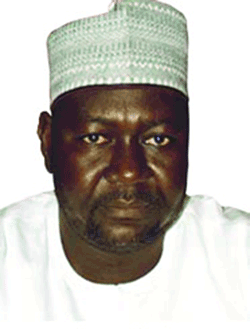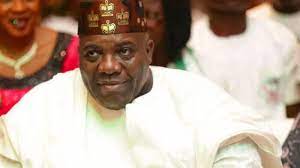ISHAYA IBRAHIM examines the bizzare route to office taken by the newly sworn in Governor of Adamawa State
Bala James Ngilari was not thought to be a major force to be reckoned with in Adamawa State politics, especially among his Peoples Democratic Party (PDP) comrades, until he pulled a victory against them on October 8 to become governor.
His boss, Murtala Nyako, was impeached as governor by the PDP-dominated House of Assembly on July 15, over 16 constitutional breaches, chief among them, but not officially listed in the charge sheet, was his defection to the All Progressives Congress (APC).
By the extant law of the land, Ngilari was simply to step in as governor after Nyako was booted out. But that did not happen.
Instead, Ngilari, a learned gentleman, was shoved aside by his party hawks in the House of Assembly, and bullied into resigning as deputy governor on the morning his boss was to be impeached.
Even his consistency in the PDP, and his refusal to follow his boss to the APC, did not count in his favour.
He has been a PDP member since 1999, represented Michika/Madagali/Maha federal constituency in the House of Representatives between 2003 and 2007, and deputy governor to Nyako from 2007 to July 15 this year when he was cornered into resigning, ostensibly to stop him from being governor.
When the plot to fire Nyako was being hatched, the House of Assembly members, who had earlier defected to the APC just like Nyako, swiftly returned to the PDP on May 20.
At the time, Ngilari had gotten the false confidence that he was on pole position to become governor with the coming on board of the Assembly members to the PDP.
But the Speaker of the House of Assembly, Umaru Fintiri, who presided over the impeachment of Nyako, emerged as acting governor, having forced Ngilari to resign some hours before the impeachment.
Ngilari approached his learned colleagues. His grouse was that he was cornered into quitting his job by lawmakers who came to his house and insisted that he should write his resignation letter and address it to the Speaker of the House of Assembly. He went to court.
The Constitution says a letter of resignation from the deputy governor should be addressed to the governor, in this case, Nyako, who was still in office when Ngilari resigned.
Constitutionally, if Ngilari had not resigned, he would have become the governor after the sack of his boss.
However, the plot line of the lawmakers was to fire both of them and pave the way for one of their own, Fintiri, to become the state’s helmsman.
Sources said one of the reasons he was not allowed to occupy the office of governor was because he is a Christian.
The claim was given credence by former Federal Capital Territory (FCT) Minister, Nasir El-Rufai, who wrote on facebook: “(Ngilari) was sacrificed because of his Christian faith to get rid of a hated governor.”
Fintiri pushed his luck further by deciding to run in the October 11 bye-election to fill the vacant position of governor in Adamawa State.
But he was a typical politician of Machiavelli’s mould in The Prince; desperate to acquire political power by all means necessary, by hook or crook – after all, the end justifies the means – not minding the legal flaws in the process.
He had failed to see the elementary logic that Ngilari’s resignation letter to the House of Assembly on the morning of July 15, at a time Nyako was still a substantive governor of the state, was a nullity, given the combined provisions of sections 306 (1), (2), and (5) of the 1999 Constitution of Federal Republic of Nigeria (as amended).
The sections of the constitution mandate a deputy governor to send his letter of resignation to the governor.
A legal egghead, Ngilari was not ignorant of this provision in the constitution, having been an outstanding lawyer himself, with a good law degree from the Ahmadu Bello University (ABU), Zaria.
His traducers were no bit wiser. They forgot his exploits at the Human Rights Violations Investigation Commission (HRVIC), popularly known as the Oputa Panel. They also failed to consider his exploits in courtrooms across Nigeria.
But Ngilari resigned anyway, albeit illegally, to use the loophole against his oppressors.
Ngilari’s lawyer, Festus Keyamo, approached the Federal High Court sitting in Abuja, with prayers, which include a declaration that by the combined provisions of sections 306 (1), (2) and (5) of the 1999 Constitution of Federal Republic of Nigeria (as amended), the Plaintiff (Bala James Ngilari), as deputy governor of Adamawa State, did not resign his office by addressing a letter of resignation dated July 15, 2014 to the 1st Defendant (Speaker, Adamawa State House of Assembly).
Keyamo also asked for an order of the court removing the 3rd Defendant (Ahmadu Umaru Fintiri) as the acting governor of Adamawa State forthwith and directing the Chief Judge of Adamawa State (or Acting Chief Judge, as the case may be) or the President of the Customary Court of Appeal to swear in Ngilari (the plaintiff) immediately as the substantive governor.
Amid smiles of victory, Ngilari was sworn in immediately as the substantive governor of the state.
Call him an accidental governor, if you like, but his roller-coaster ride to Adamawa Government House is just a case of a man who laughs last. While some jesters may think he did not catch the joke early enough, he still remains the one that laughs best.













